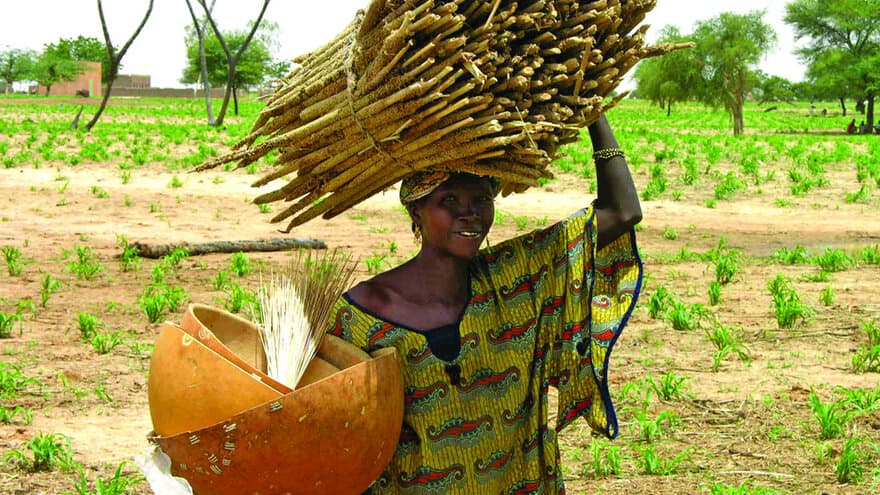About us
The Climate Change, Food Systems, Agriculture, and Development (CC-FAD) research cluster is a dynamic and multidisciplinary group that addresses some of the most urgent and interconnected challenges of our time. The name reflects the cluster’s broadened scope, which now explicitly includes food systems - an essential component at the nexus of climate resilience, sustainable agriculture, and equitable development.
The CC-FAD cluster operates across disciplinary boundaries, bridging the natural sciences, social sciences, and humanities. Its members engage with both natural sciences and critical (e.g., political ecology, decolonial, feminist) and development-oriented (e.g., policy, practice, innovation) perspectives. This openness enables the cluster to challenge dominant paradigms while also contributing to practical solutions. For example, work within the cluster often combines ecological and agronomic research with institutional analysis, participatory methods, and grounded ethnography.
Reflecting a global outlook, the cluster’s field-based research is predominantly situated in the Global South, where climate vulnerability, food insecurity, and development imperatives are particularly acute. Research activities span diverse geographies - from East and Southern Africa to South Asia and Latin America - while also maintaining analytical relevance to broader global dynamics and governance structures.
The cluster is involved in several high-impact projects funded by national and international bodies, including the Research Council of Norway, the European Commission’s Horizon 2020 (H2020) program, and the Norwegian Ministry of Foreign Affairs, among others. These projects examine critical themes such as climate adaptation in agriculture, resilient seed systems, gendered impacts of food insecurity, agroecology, and the political economy of land and resources.
The Climate Change, Food Systems, Agriculture, and Development (CC-FAD) cluster is well-positioned to lead cutting-edge, socially engaged, and impact-driven research. Its revised identity captures the complexity and urgency of interlinked global challenges—climate change, altered ecosystem processes in agriculture, Forest, and Aquatic ecosystems, broken food systems, and uneven development—while embracing a vision of transformation rooted in sustainability, justice, and inclusivity.
Research themes
- Agrarian Change, Resilience, and Transformation in the Face of Climate Change
Investigating how rural communities adapt to and transform under climate stress, with a focus on just and sustainable transitions in agricultural systems. - Agroecology
Promoting ecological principles in farming systems to improve productivity, biodiversity, and social equity through context-specific solutions. - Agrobiodiversity Conservation and Use
Preserving and utilizing genetic diversity in crops and livestock to strengthen resilience, adaptation, and sustainable food production. - Sustainable Intensification of Agriculture
Increasing agricultural productivity while minimizing environmental harm, using context-appropriate technologies and practices. - Environmental Impacts of Agriculture and mitigation of GHG emission
Assessing how agricultural activities affect ecosystems, soils, water systems, and climate—aiming to mitigate negative impacts through sustainable practices. - Agri-Food System Governance and Trade
Analyzing policies, institutions, and power dynamics that shape food systems, market access, seed laws, and global trade relations. - Seed Systems and Farmer Innovation
Investigating formal and informal seed systems, farmer-led innovation, and access to diverse, climate-resilient seeds. - Food and Livelihood Security
Exploring strategies to enhance access to nutritious food and stable incomes, particularly among vulnerable populations in the Global South. - Gender, Equity, and Social Justice in Agriculture and Food Systems
Examining the intersection of gender, class, and ethnicity in shaping food access, land rights, and participation in agricultural decision-making. - Climate Adaptation and Risk Management
Developing tools, knowledge systems, and governance strategies to manage climate-related risks in agriculture and rural livelihoods. - Decolonial and Critical Perspectives on Development
Challenging dominant narratives in agricultural development through critical and inclusive approaches, rooted in Indigenous and local
- Agrarian Change, Resilience, and Transformation in the Face of Climate Change
Members
Associated members
Gry Synnevåg
- Climate change adaptation
- Sustainable agriculture
- Semi-arid regions
- Mali
Lars Olav Eik
Professor Emeritus
- Livestock systems
- Agroecology
Tsedal Asres WendmuResearcher
- Seed systems
- Agricultural innovation
- Role of women in food systems
PhD Fellows

Researching agri-food systems across global and local scales.